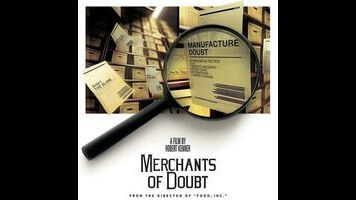That sounds interesting enough, except that, in this glossy informational mode of filmmaking, organization is everything, and director Robert Kenner (Food, Inc.) isn’t much of a storyteller. Artless and gimmicky, his style is heavy on ironies and analogies—a magic act framing device here, a montage of waffling politicians set to David Bowie’s “Changes” there—and short on unifying perspective. Included are profiles of Skeptic editor Michael Shermer and former Republican congressman Bob Inglis, a rundown of the Chicago Tribune’s reporting on flame retardants, an exposé of libertarian think tanks that doesn’t really go anywhere, and even a semi-affectionate portrait of professional attack dog Marc Morano. A viewer might be inclined to say that Kenner has bitten off more than he could chew, if anything about the movie suggested that he had teeth.
What he does have is a broad subject and access to a large cast of colorful interviewees: professional climate skeptic Fred Singer, a physicist who previously spoke on behalf of tobacco companies; anti-smoking activist Stanton Glantz; the totally amoral Morano, who more or less admits that he’s only in it for the thrill of the game. There’s a reason folks like Singer and Morano are able to affect public policy with specious data, and it’s because they’re good at playing characters and cracking self-deprecating jokes and generally being interesting on camera, and real climate scientists aren’t.
Merchants Of Doubt can’t seem to resolve that conflict between information and interest. Lies like these work because they offer a more captivating alternative to the truth, or at least an alternative that’s more in line with what people already want to believe, and plenty of good and great non-fiction films have been animated by a fascination with liars. (It might sound paradoxical, but fiction is one of the defining themes of the documentary as a medium.) Of course, a word like animated presumes that Merchants Of Doubt is anything more than an impersonal book report with above-average production values. Even when it does stumble into something like a point-of-view—as it does when Oreskes, who’s presented as just another interviewee, suggests that Singer doesn’t shill for corporations because of the money, but out of political principle—it doesn’t feel like it’s the film’s own.









































